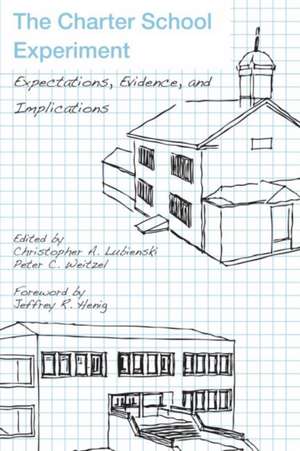The Charter School Experiment: Expectations, Evidence, and Implications
Jeffrey R. Henig Editat de Christopher A. Lubienski, Peter C. Weitzelen Limba Engleză Paperback – 31 aug 2010
Preț: 216.81 lei
Preț vechi: 288.94 lei
-25% Nou
Puncte Express: 325
Preț estimativ în valută:
41.49€ • 43.31$ • 34.34£
41.49€ • 43.31$ • 34.34£
Carte indisponibilă temporar
Doresc să fiu notificat când acest titlu va fi disponibil:
Se trimite...
Preluare comenzi: 021 569.72.76
Specificații
ISBN-13: 9781934742662
ISBN-10: 193474266X
Pagini: 304
Dimensiuni: 152 x 229 x 15 mm
Greutate: 0.41 kg
Editura: HARVARD EDUCATION PR
ISBN-10: 193474266X
Pagini: 304
Dimensiuni: 152 x 229 x 15 mm
Greutate: 0.41 kg
Editura: HARVARD EDUCATION PR
Textul de pe ultima copertă
When charter schools first arrived on the American educational scene, few observers suspected that within two decades thousands of these schools would be established, serving almost a million and a half children across forty states. The widespread popularity of these schools, and of the charter movement itself, speaks to the unique and chronic desire for substantive change in American education. As an innovation in governance, the ultimate goal of the charter movement is to improve learning opportunities for all students--not only those who attend charter schools but also students in public schools that are affected by competition from charters.
In The Charter School Experiment, a select group of leading scholars traces the development of one of the most dynamic and powerful areas of education reform. Contributors with varying perspectives on the charter movement carefully evaluate how well charter schools are fulfilling the goals originally set out for them: introducing competition to the school sector, promoting more equitable access to quality schools, and encouraging innovation to improve educational outcomes. They explore the unintended effects of the charter school experiment over the past two decades, and conclude that charter schools are entering a new phase of their development, beginning to serve purposes significantly different from those originally set out for them.
"The Charter School Experiment is a balanced and scholarly assessment of the strengths and weaknesses of charter schools, which should inform the current policy debate." -- Diane Ravitch, research professor of education, New York University and nonresident senior fellow, Brookings Institution
"Faith in charter schools is skyrocketing. But as Washington tells states to open more charters, does this politically sexy innovation actually work? When their performance flags, why? How might inventive schools actually challenge the status quo? Squarely addressing these questions, this book arrives at just the right time. A must-read for parents, educators, and reform leaders, not to mention White House staffers." -- Bruce Fuller, professor, education and public policy, University of California, Berkeley
"Both thoughtful and provocative, The Charter School Experiment is one of the most thorough and balanced works on what we have learned about charter schools." -- Henry M. Levin, William Heard Kilpatrick Professor of Economics and Education, and director, National Center for the Study of Privatization in Education, Teachers College, Columbia University
Christopher A. Lubienski is associate professor of education policy and a fellow at the Forum on the Future of Public Education at the University of Illinois at Urbana-Champaign. Peter C. Weitzel is an advanced doctoral student in educational organization and leadership at the University of Illinois at Urbana-Champaign.
In The Charter School Experiment, a select group of leading scholars traces the development of one of the most dynamic and powerful areas of education reform. Contributors with varying perspectives on the charter movement carefully evaluate how well charter schools are fulfilling the goals originally set out for them: introducing competition to the school sector, promoting more equitable access to quality schools, and encouraging innovation to improve educational outcomes. They explore the unintended effects of the charter school experiment over the past two decades, and conclude that charter schools are entering a new phase of their development, beginning to serve purposes significantly different from those originally set out for them.
"The Charter School Experiment is a balanced and scholarly assessment of the strengths and weaknesses of charter schools, which should inform the current policy debate." -- Diane Ravitch, research professor of education, New York University and nonresident senior fellow, Brookings Institution
"Faith in charter schools is skyrocketing. But as Washington tells states to open more charters, does this politically sexy innovation actually work? When their performance flags, why? How might inventive schools actually challenge the status quo? Squarely addressing these questions, this book arrives at just the right time. A must-read for parents, educators, and reform leaders, not to mention White House staffers." -- Bruce Fuller, professor, education and public policy, University of California, Berkeley
"Both thoughtful and provocative, The Charter School Experiment is one of the most thorough and balanced works on what we have learned about charter schools." -- Henry M. Levin, William Heard Kilpatrick Professor of Economics and Education, and director, National Center for the Study of Privatization in Education, Teachers College, Columbia University
Christopher A. Lubienski is associate professor of education policy and a fellow at the Forum on the Future of Public Education at the University of Illinois at Urbana-Champaign. Peter C. Weitzel is an advanced doctoral student in educational organization and leadership at the University of Illinois at Urbana-Champaign.
